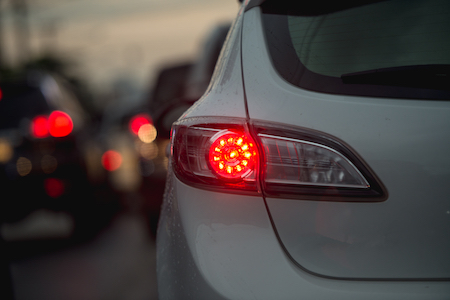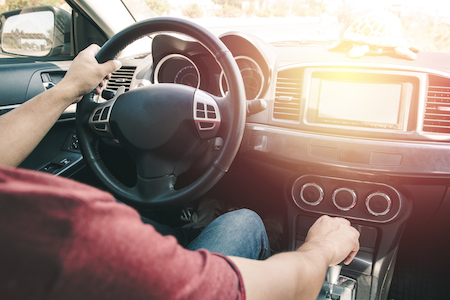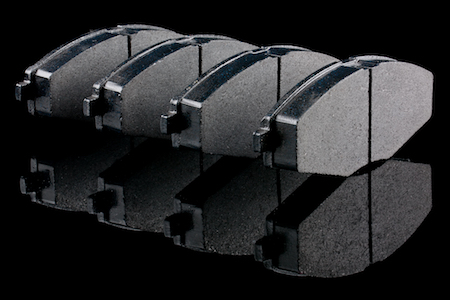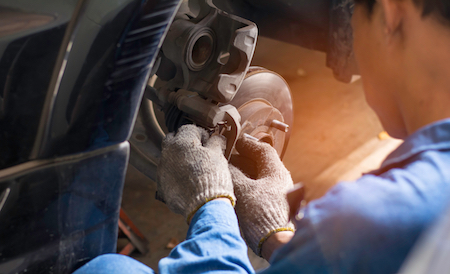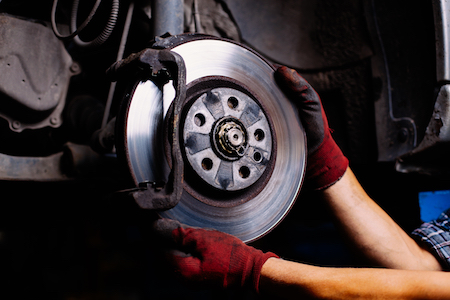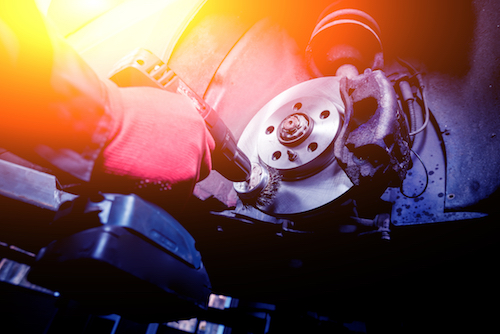Driving here in the Denver metro area isn’t an option; it’s a necessity. While mass transit is increasing, most of us only use it on a part-time basis. It might work if you work downtown, or if you want to head to a ballgame, but eventually, you’ll have to climb behind the wheel and drive to where you need to go.
It’s easy to forget how much power you have when you put your car into motion. Thousands of pounds of steel can fly down the highway at fifty, sixty, seventy miles per hour or more.
We rely on everything to work the way it should. And if you maintain your vehicle properly, everything will work correctly.
But imagine if you push down on the brake pedal and nothing happens. That can be a scary feeling as you’re slowing for a stop sign in the middle of Denver. Now imagine that same thing happening on your way home from a ski weekend, flying down I-70.
How important are your brakes? At that moment, you’re likely to think they’re the most essential things in the world.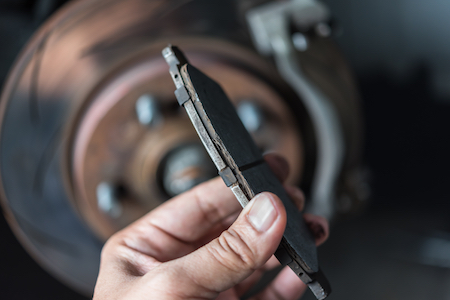
Eventually, every car will need new brakes. Every part on a vehicle will wear out over time.
The critical part of the process is recognizing the signs and replacing your brakes long before they become a problem. The last thing you want is to put your family, or the lives of others out on the road in jeopardy. Luckily, your vehicle does give you warning signs that your brakes have a problem.
This can help you determine when to replace old brakes with new brakes, and ensure your car keeps working the way it should.
How brakes work
Before you can understand the signs of brake failure, it’s important to know how brakes work.
Most cars on the road today use disc brakes. These function in much the same way as your multi-speed bicycle. Have you ever gripped the brake handle on a bike and noticed two pads clamping down on the tire to stop it?
With a vehicle, a hydraulic system is filled with brake fluid that triggers a set of brake pads to clamp down on the wheel whenever the brake pedal is pushed to start the stopping process. These padded clamps are known as calipers, and the squeeze together onto a disc down as the rotor. As the brake pads connect with the disc, friction occurs until eventually, the car stops.
Think, for a moment, about how much heat this friction generates. While new pads may be strong and powerful, eventually, this material wears down. The thinner it gets, the more chance your brake system has of failing. That means a slowing effect at stopping your car.
This leads to your first sign of brake failure.
Worn Brake Pads
Brake pads are crafted from a variety of different materials.
Most cars use semi-metallic brake pads. These pads are made of metal shavings of copper, steel, graphite, and brass, all bonded together with resin to create a high-quality product that works well for everyday driving.
Some vehicles look for better performance and choose organic brake pads. These are comprised of non-metallic components like glass, rubber, and Kevlar, bonded in resin.
Still others choose ceramic brake pads comprised mostly of ceramic fibers and bonded together using resin. They often have copper fibers woven within. These are designed for performance vehicles, including racing cars that generate higher levels of heat when applying the brakes.
Checking to determine if your brake pads are worn is a fairly straightforward process. All you need to do is look through the spokes of your wheel and find the disc or rotor inside. You’ll notice the caliper sits on the outer edge. Between the caliper and the rotor is the brake pad. Brake pads should be at least one-quarter inch thick to work properly. If the brake pad appears to be thinner than this, it’s time to add new brake pads.
If your car is designed in such a way that you can’t see through it, you’ll need to remove your tire to see the rotor and pads. If you don’t have experience in doing this yourself, we can do it for you and let you know how much life your brake pads have.
Strange Sounds
If you’ve had your vehicle for a while, chances are you know all the sounds your car makes. When a squeal occurs, it’ll come to your immediate attention.
Brake pads are designed to produce this sound to let you know it’s time for replacement. A small indicator is built into the braking system to give you a warning sign that servicing is necessary. This sound is designed to be loud, so you’ll hear it over the radio or other things going on in your car.
In addition to squealing, you might also hear grinding. This means your brake pads are completely worn through, and the calipers are now grinding against the metal of your rotors. If this continues to occur, you’ll damage the rotor, and it will no longer be as simple or as inexpensive as merely replacing the brake pads.
Pulling Sensation
Have you ever felt as if your car is driving on its own? That it’s pulling you to the right or left while you’re driving or braking?
This is a sign of a potential problem with your brake system. It might be a sign of a stuck caliper. If it’s stuck, it will cause friction to one wheel and not the others. This would create a pull to one side of the vehicle as your driving and stopping.
A broken brake hose could also cause your calipers to move unevenly, making it feel like your car is pulling to one side or the other. It would apply different levels of pressure when you press the brake pedal, causing more friction to one side or the other.
Vibrations
Have you ever pushed down on the brake pedal, and a quick pulsating feeling comes through as the car slows? This goes beyond the feeling of anti-lock brakes. If you notice this happening through your brake pedal, and it gets worse the farther you press down, you could have a problem.
A vibrating brake pedal often indicates you have warped rotors. When the surface area becomes uneven, the brake pads won’t connect smoothly. You’ll feel this as the wheel goes around and continues to slow.
In addition to this thrumming feeling, you might also notice your brake pedal becomes mushy, and pushes all the way down before engaging the brakes. This might be a problem with the brake pads, or a fluid leak in the hydraulic system. If you’ve noticed a leak underneath your car, brake fluid has a clear consistency similar to cooking oil.
The opposite can also occur, where the brakes grab at the slightest touch. This might be a worn rotor or dirty brake fluid. Your mechanic can help you define the problem and solve it as quickly as possible.
Few can deny that a brake system is one of the most critical systems in a car. If you think you need new brakes, or aren’t sure where the problem lies, stop by today. We’ll help you get back on the road again safely in no time.

